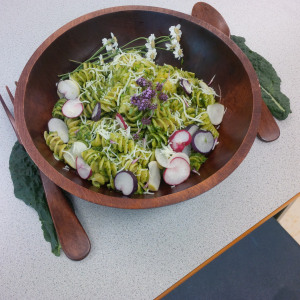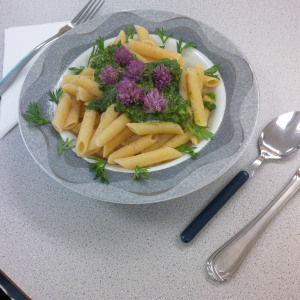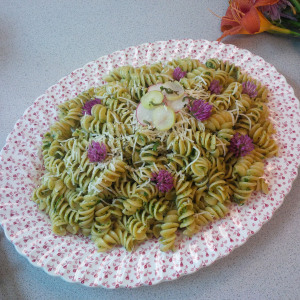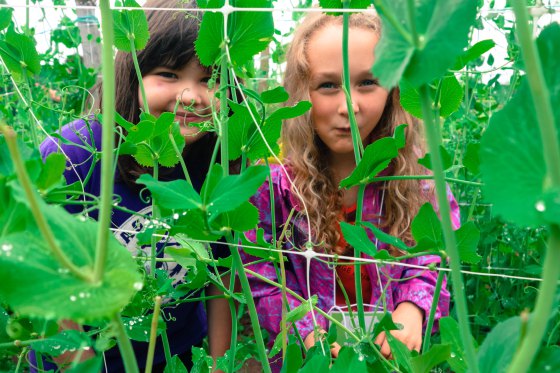
This past week the Ecology Action Centre – Cheticamp Branch hosted a gardening and cooking camp for kids age 7 – 11. This was the first time for the camp and it was a huge success.
The camp included activities ranging from harvesting vegetables to using them in cooking and touring farms. This allowed the children to see all aspects of food and help facilitate d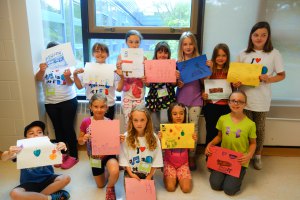 iscussions on local food and why buying local is important.
iscussions on local food and why buying local is important.
Trying new things
At the start of the week there was one child who was crying and did not want to come to camp because they did not like vegetables. When we heard this we thought, great we are in for a treat, a bunch of kids who will not try anything and who will not eat vegetables, however, biggest surprise that we had was the willingness of the children to try new foods. Many of the kids had not tried a lot of different types of vegetables, including spinach and bell peppers, which was slightly shocking. We started by setting some rules at the beginning of the week one of which was ‘no yucky faces’. This was so that if the kids did try something and not like it they would not discourage any of the others from trying it. This worked pretty well with a few reminders along the way to not scream out ‘I didn’t like it!’. When cooking, we tried to work in small groups this allowed us to be able to give some pep 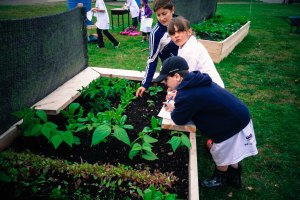 talks to the kids about trying new things. We also made some of the cooking into a competition, Master Chef Style, which helped the kids feel more ownership over what they were making and more intrigued to try it out.
talks to the kids about trying new things. We also made some of the cooking into a competition, Master Chef Style, which helped the kids feel more ownership over what they were making and more intrigued to try it out.
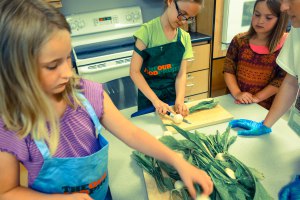
We were able to help the kids see that if they went into the experience of trying a new food with a negative mindset, thinking they were not going to like it then they probably would not like it. But if they went in to the experience wanting to like it and wanting to try as many new things as possible they would have a better chance of liking it. We also were able to explain that if you like more food you can eat moredifferent foods and that means you have more choice for what you eat and will get many different nutrients. Kids will constantly surprise us with their intelligence and capacity to be adventurous. I think, as adults, we need to try to open up our own horizons a bit more so that it will extend to our kids and will allow them to have more diversified diets for not only better nutrition but also better enjoyment and relationships with food.
In the end the child who cried about not wanting to come because he hated vegetables was the biggest advocate for the Lamb’s Quarters Pesto Pasta.
Master Chef Competition Dishes (Lamb’s Quarters Pesto Pasta – made by the kids, each group being able to add a personal twist to their dish)
What does food mean to you?
Besides the satisfying moments when the children tried new foods and liked them, we had a really great discussion on ‘what does food mean to you?’. For this activity we asked the kids to draw a picture of what food means t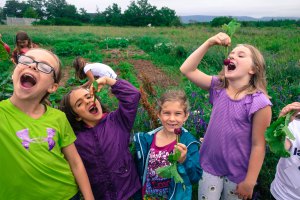 o them. After they all drew their pictures we went around the room and shared what we drew and why. Some drew their favorite foods, gardens, cooking and some others drew some holiday meals with their families and friends. This was great to see because it showed that kids have an understanding that food is not only something we need to eat to survive but also something that has huge social implications, including bringing people together.
o them. After they all drew their pictures we went around the room and shared what we drew and why. Some drew their favorite foods, gardens, cooking and some others drew some holiday meals with their families and friends. This was great to see because it showed that kids have an understanding that food is not only something we need to eat to survive but also something that has huge social implications, including bringing people together.
I think this whole week was a very important lesson for all the children, helping them all develop a better relationship with food. The EAC and the Our Food Project has a goal to help increase cooking, growing and preserving food skills. The EAC has found that people think these skills are important, however, they are not that confident or do not have a high skill level in these facets of life. To improve these skills in our society we need to target children and help build the skills from a young age so that our society becomes more self-sustaining, knowledgeable and in turn healthier. I think having camps like this really helps kids see the value of food in their lives and how important it is to be able to grow and cook your own food. By being able to teach kids to have ownership over their food and by building these relationships 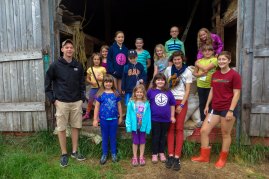 with food we are helping kids have more independence and teaching them valuable life skills that they will use continuously over their lifetime.
with food we are helping kids have more independence and teaching them valuable life skills that they will use continuously over their lifetime.
Mikaela Henderson
BSc. HNU with honours
Dietetic Intern with the Ecology Action Centre – St. Francis Xavier University

